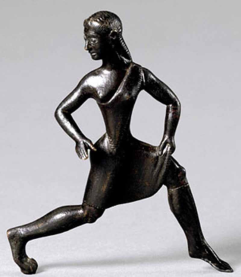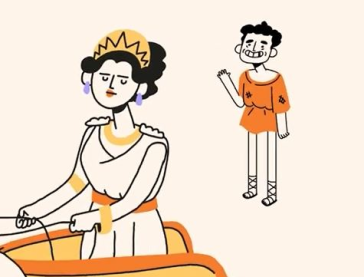 article icon
article icon
History & The Arts
World-Changing Women: Cynisca
Spartan females had much more freedom than other women in the ancient world; this allowed Cynisca of Sparta to win the Olympics twice. Find out more about her victories here...
 article icon
article icon
History & The Arts
The Olympic torch: the truth
We delve into the real history behind the Olympic torch - including its Nazi origins
 activity icon
activity icon
Languages
The evolution of English: From the 17th century to the present day
Part two: The history of colonialism was a major factor in the development of English. Follow the global spread of English from the 17th century to the present day.
 article icon
article icon
History & The Arts
What did Voltaire think about Buddhism?
Donald S. Lopez, Jr. looks at Voltaire’s early reflections on Buddhism and how, in his desire to separate the Buddha’s teachings from the trappings of religion, the French Enlightenment thinker prefigured an approach now familiar in the West.
 video icon
video icon
History & The Arts
The life of Mama Elouise Edwards
From her birth in Georgetown, British Guiana, to her MBE for services to the Manchester community, this article explores the extraordinary life of Mama Elouise Edwards...
 article icon
article icon
Society, Politics & Law
Raymond Williams a Leonardo Sciascia: Cofio bywydau a gwaddolion
Roedd Raymond Williams a Leonardo Sciascia, y ganwyd y ddau yn 1921, yn ysgolheigion, yn nofelwyr ac yn feirniaid nodedig. Mae Geoff Andrews yn ystyried eu bywydau a'u gwaddolion yn yr erthygl hon.
 article icon
article icon
Health, Sports & Psychology
Euro 2020
The UEFA European Championships conclude at Wembley on 11 July. In between the knock-out games, check out the expert insights and free sport courses in our Euro 2020 hub.
 article icon
article icon
Society, Politics & Law
The Tulsa Race Massacre
The Tulsa Race Massacre of 1921 saw between 39-300 people killed and 10,000 African Americans made homeless after two days of state violence. So why have we only begun to hear about this recently? Dr David Scott explores.
 article icon
article icon
Society, Politics & Law
Raymond Williams and Leonardo Sciascia: Intellectuals At the Margins
Raymond Williams and Leonardo Sciascia, both born in 1921, were two notable intellectuals, novelists and critics. Geoff Andrews explores their lives and legacies in this article.
 article icon
article icon
Society, Politics & Law
Why books are a lifeline for prisoners
The Independent's Terence Blacker was on a visit to a prison to talk about the benefits of reading, when he heard about the ban on books. Where better to contemplate the folly of the move, he asks?
 video icon
video icon
Languages
La historia del español en unos seis minutos
¿Cuándo se empezó a hablar español? ¿De dónde vienen palabras como siesta, cerveza o paella? ¿Qué lenguas han influido en el español?
 audio icon
audio icon
Languages
Los sonidos del Español en su historia
Se presenta a continuación una selección de textos correspondientes a distintas etapas de la historia de la lengua española, a partir de los cuales se puede observar su evolución.